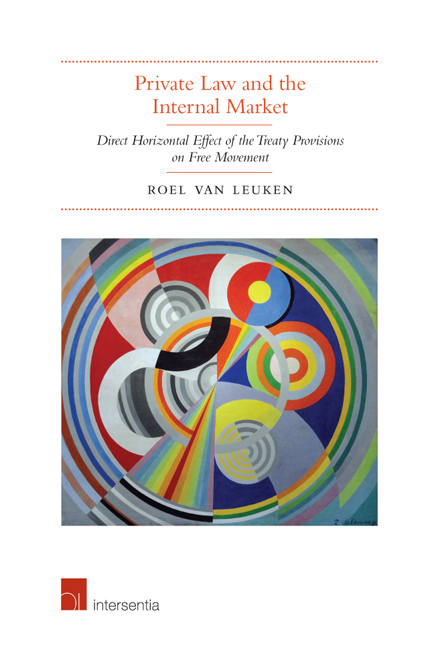 Private Law and the Internal Market
Private Law and the Internal Market Book contents
- Frontmatter
- Preface
- Contents
- Table of Cases
- List of Abbreviations
- Chapter 1 Introduction
- Part I Direct Horizontal Effect: Concept and Application in Competition Law
- Chapter 2 Direct and Indirect Effects of the TFEU on Legal Relationships between Individuals
- Chapter 3 Direct Horizontal Effect of Articles 101(1) and 102 TFEU: Private Law Consequences
- Part II Direct Horizontal Effect: Internal Market
- Part III Justifications
- Bibliography
- Index
Chapter 2 - Direct and Indirect Effects of the TFEU on Legal Relationships between Individuals
from Part I - Direct Horizontal Effect: Concept and Application in Competition Law
Published online by Cambridge University Press: 27 September 2018
- Frontmatter
- Preface
- Contents
- Table of Cases
- List of Abbreviations
- Chapter 1 Introduction
- Part I Direct Horizontal Effect: Concept and Application in Competition Law
- Chapter 2 Direct and Indirect Effects of the TFEU on Legal Relationships between Individuals
- Chapter 3 Direct Horizontal Effect of Articles 101(1) and 102 TFEU: Private Law Consequences
- Part II Direct Horizontal Effect: Internal Market
- Part III Justifications
- Bibliography
- Index
Summary
INTRODUCTION
This chapter presents a general introduction to two legal concepts which, either each on their own or in concerted action, serve to ensure the effectiveness of EU law, namely direct effect (section 2.2.) and primacy (section 2.3.). To properly grasp the direct and indirect effects of the TFEU on legal relationships between individuals and to distinguish the different mechanisms by which such effects are produced, it is essential to have a good understanding of both concepts and of how they interact (section 2.4.).
DIRECT EFFECT
On 9 September 1960 a Dutch transport company, Van Gend & Loos, imported a quantity of urea formaldehyde from Germany and with respect to this importation paid the Netherlands Inland Revenue Administration statutory import duty, at a rate which several months earlier had been increased from 3 per cent to 8 per cent. Van Gend & Loos believed that this increase infringed Article 12 EEC, which read as follows:
Member States shall refrain from introducing, as between themselves, any new customs duties on importation and exportation or charges with equivalent eff ect and from increasing such duties or charges as they apply in their commercial relations with each other.
A Member State that infringed Article 12 EEC could be held liable by the European Commission or another Member State for its failure to respect what then was still Community law via the procedures of Articles 169 and 170 EEC (now Articles 258 and 259 TFEU). In spite of the fact that it was unclear at the time whether the EEC Treaty also off ered individuals the opportunity to enforce observance by the Member States of this negative obligation, Van Gend & Loos relied on Article 12 EEC before the national courts to obtain repayment by the Netherlands Inland Revenue Administration of the additional amount it had paid in import duties. Th e Administrative Court for Customs and Excise (Tariefcommissie) then requested the Court of Justice to give a preliminary ruling under Article 177 EEC (now Article 267 TFEU) on the question
whether Article 12 of the EEC Treaty has direct application within the territory of a Member State, in other words, whether nationals of such a State can, on the basis of the Article in question, lay claim to individual rights which the courts must protect.
- Type
- Chapter
- Information
- Private Law and the Internal MarketDirect Horizontal Effect of the Treaty Provisions on Free Movement, pp. 11 - 26Publisher: IntersentiaPrint publication year: 2017


